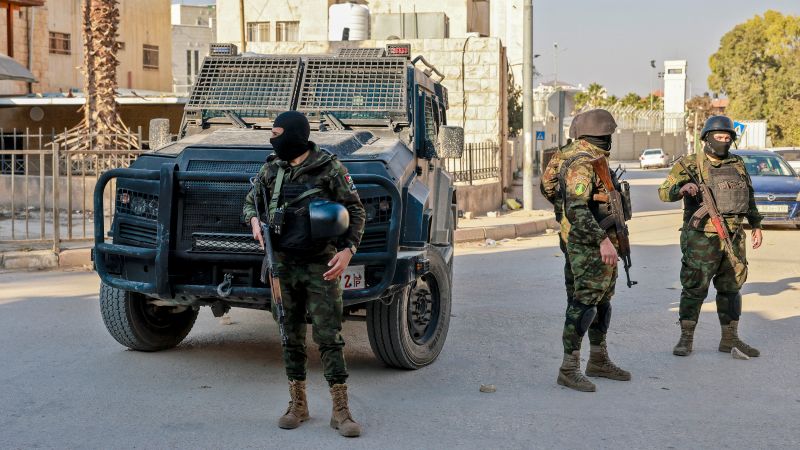[Here is the content:
For more than a week, the sprawling Jenin refugee camp in the occupied West Bank has echoed to the sound of heavy gunfire – with masked snipers on rooftops and muffled explosions within its warren of alleyways. The combat is between Palestinians: the security forces of the Palestinian Authority and militant groups aligned with Hamas who say the PA has sold out to Israel.
The authority, supported by the West, launched its largest security operation in years to dislodge the militant groups in an attempt to show that it can handle the security situation in the West Bank as it eyes control over a post-war Gaza. But the operation appears only to have stiffened resistance and alienated many of the thousands of civilians who live there. And they have gained little ground, with militants still in control of much of the camp.
The authority’s security forces have tried to arrest dozens of men they describe as “outlaws” trying to “hijack” the camp, which was established for Palestinians uprooted from their homes after Israel’s creation in 1948 and is now a built-up area that is home to some 25,000 people. Hamas describes the fighters in the camp as the “resistance” – a coalition of militant groups that sees the authority and its security forces as doing Israel’s bidding.
The militant factions include the Al Aqsa Martyrs’ Brigade, Palestinian Islamic Jihad, and the Qassem Brigades, who fight under the banner of the Jenin Battalion. The authority says that its forces have “advanced in very important ways” in the camp. But they have little of the technology and weaponry the Israeli military can bring to bear, and on Sunday a member of the Palestinian Presidential Guard was killed by militants’ gunfire.
One militant leader has also been killed, as have three teenagers, the youngest of them 14. Each side blamed the other for their deaths. The flare in violence caps off a deadly year in the area. Israel conducted a days-long raid in Jenin, Tulkarem, and Tubas, in the northern West Bank, in September, killing at least 39 people and leaving widespread destruction, according to the authority’s health ministry and the United Nations.
The Palestinian Authority is nominally in charge of security in much of the West Bank under the Oslo Accords, signed in the 1990s with the aim of establishing a Palestinian state. But in the years since, Israel has extended its control of the occupied territory, expanded settlements and carried out frequent raids against militant Palestinian groups. If the authority wants to take on a broader role in administering Palestinian areas or seek a return to Gaza – something that Israeli government has persistently ruled out – Jenin is a litmus test.
One of the militant commanders, Qais al Saa’di, told CNN in an interview deep inside the camp: “Israel is giving the authority a chance in Jenin, essentially saying, ‘If you can prove that you can control Jenin, a small city, then we’ll consider handing you Gaza.'” Events in Jenin are also a bellwether for Iranian influence among the militants. Al-Sa’adi acknowledged that help was coming from Iran, a growing concern to the Israeli security services.
The extent and type of Iranian backing for the militants is hard to assess. But the Israeli security forces said in November they recovered large amounts of Iranian-supplied weapons near Jenin. Defense Minister Israel Katz said on a recent visit to the West Bank that “Iran will not succeed in establishing an Iranian ‘octopus’ arm’ in the refugee camps.” A new fence on the border with Jordan would “prevent Iranian plans to smuggle weapons into Israel through Jordan.” A spokesman for the Palestinian security forces, Brigadier General Anwar Rajab, told CNN that by financing the militants, Iran was seeking to spread “chaos and corruption” and weaken the Palestinian Authority, something that serves the interests of its projects in the region.
The Jenin Battalion is entrenched in the camp, the nerve center of a new wave of Palestinian militancy in the occupied territories. The militant group’s growing use of improvised explosive devices (IEDs) has added a layer of complexity for Israeli and Palestinian authority’s efforts to combat them. Qais Al-Sa’adi told CNN that IEDs had done severe damage to Israeli military vehicles, and he warned the security forces: “If you come into our area, you’ll face the same fate.” “Urban warfare is our expertise, and it’s a game-changer,” he added. The security forces maintain that the militants are endangering innocent lives by planting explosive mines in the streets and in residences.
The confrontation in Jenin has polarized Palestinian opinion. Assad Aqel, a 27-year-old fighter who was seriously injured in an Israeli drone attack last year, told CNN that the people of the camp needed protection from the Israeli military – which was not being provided by the Palestinian Authority. Aqel and other Jenin residents said the authority’s security operation had made life much more difficult – and dangerous in the camp, with some suggesting that it amounted to collective punishment. By the end of last week, much of the camp was without water and electricity. Garbage was piling up, and children were unable to get to school. The UN agency for Palestinian refugees, UNRWA, said last week it had suspended its services to the camp, which include education and healthcare, amid the fighting. The agency condemned the occupation of its health center in Jenin camp by “Palestinian armed actors” last week.
Source link

